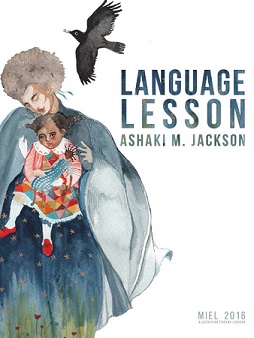BY KENJI LIU
From: Therumpus.net
A gifted poet and doctor of social psychology, Ashaki M. Jackson debuted two chapbooks in 2016, both remarkable for their delicate attention to language and conscience. Language Lesson involves the deeply personal process of grief after the loss of a close family member, and Surveillance a kind of communal grief (though no less personal) due to the ongoing police murders of black people.
Language Lesson (Miel 2016)
There is something about grief that can encourage writing that is sparse, full of space, as if to give the process necessary room to breathe. It is, however, not an empty space—it is filled to overflowing, with what has only recently departed, what remains, and what rushes in to try to fill the space. The chapbook Language Lesson is both a sacred pause and a moving prayer.
Full of white spaces for the eye to rest in and move through, with words and short phrases draping and swaying over each other, each poem in Language Lesson is its own suspended vessel of sternum, shoulder, skin, tongue, throat, ribs, bellies, and breath. Its poems traffic in hymn, scent, fury, wail, choke, bloom, root, hum, and keen. We witness flesh and bone opening, bending, bowing, swallowing, collapsing, filling, dissolving, and forgetting. Jackson’s lines unfold gracefully, drawing the reader inward and through the stumbling body of grief:
Our mouths: her grave___ thick-
tongued cavern ___From our throats she blooms
Sunday hymn toward a quiet sky
*
Thick-tongued quiet___ Our mouths
caverns __graves __Our throats
bloom a Sunday sky hymn
Towards the book’s end, we feel a shift as the speaker in Language Lesson starts to confront absence and forgetting—what happens when the physical presence of the departed’s body eventually goes missing, due to time or accident? Without that physical presence, what happens when the dead begin to escape our memories, when the speaker realizes, “Loss is a season”?
________Do not interrupt
when I ask myself
_____Who was crying
_____Who now wears her scent without ceremony
My memory begins to swallow
the grave
In this final poem of the book, the speaker consciously initiates a new direction, signaling perhaps not the end of mourning, but something else: “I want a turn.”
ashaki-jackson
While death is obviously a universal experience, reading Language Lesson in the context of Jackson’s other chapbook, Surveillance—and the continuing police murders of black people—one is struck by the centuries of racial inequities that have prevented (and keep preventing) so many from dying peacefully in the manner of their own choosing. Read Rest of Review Here
